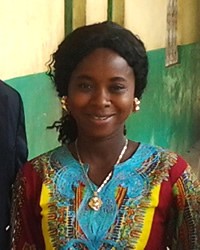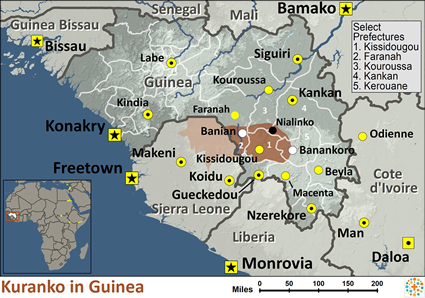The Kuranko, also known as the Koranko, are a branch of the Malinke tribe that immigrated into Sierra Leone from Guinea. Within their geographical region there are different dialects and social groupings. The different groups each have their own chiefs, traditions and heritage. Some are hunters, some are warriors some are traders. Tribal mixing and cultural mixing characterize Kuranko history.
The Kuranko occupy a mountainous region within the northeastern Sierra Leone highlands, extending into Guinea. This region lacks adequate road systems and is not easily accessible, leaving the Kuranko socially isolated. This may explain why most have held on to their traditional culture and religion.
The Kuranko are primarily farmers. Rice is the main crop cultivated, and the money made from it barely cover family expenses. Supplementary crops include Cotton, potato, corn, pumpkin and indigo. Every household has tropical fruit trees for daily eating.
They eat peanuts but most of their protein comes from fish. Surprisingly, women do most of the fishing. Every family keeps chickens to offer as gifts. Hunting is done by the men.
Childhood for a boy or girl lasts until puberty. At this time, a ritual purification ceremony, called a biriye, ushers them into adulthood. It involves circumcision for boys and the right to wear certain clothes.
An adult is expected to show honor and respect for their ancient customs of the Kuranko. They do this by joining various cult associations. The Gbansogoron ("cheek piercers") show bravery through self-inflicted pain. The Segere is a women's cult which supports women's rights. Today, schooling has become a symbolic replacement for the cult system and initiation rituals. As literacy and educational opportunities increase, perhaps the power of the cult societies will decrease.
Less than one-third of the Kuranko in Sierra Leone are marginally Muslim. The majority of the remaining Kuranko follow their traditional ethnic religion.
The Kuranko sometimes think of "the wild" as opposite to village life, and they use animal metaphors to identify evildoers. Someone without faith is likened to a dog; one who steals is as a monkey; and a traitor is as a snake. The Kuranko believe that certain people can change into animals to harm others. Certain animals, such as the vulture, the bat and the black cat symbolize witchcraft. The Kuranko believe that in the forests, the rivers, and the mountains live quasi-human beings known as Nyenne. These are "bush spirits," who are believed to influence Kuranko life in different ways.
The Nyenne are rarely seen but are feared. The Kuranko believe the Nyenne live in the bush near the villages and live in houses with their families. A Kuranko will make a sacrifice to one of these Nyenne when clearing land for his farm. They believe the Nyenne can make women barren, cause insanity and farming accidents. The Kuranko also believe that they can be friendly, bringing good fortune.
The Kuranko have the New Testament available to them. Only a small percentage of the Kuranko has put their faith in Christ rather than the spirit world.
There is a strong need for evangelization.
Pray that God will give the Kuranko believers boldness to share Christ with their own people.
Ask the Lord of the harvest to send forth additional laborers to the Kuranko of Sierra Leone.
Pray for the Lord to reach the Kuranko people in supernatural ways.
Pray for the effective use of the JESUS Film in the Kuranko language.
Ask the Lord to bring forth churches that will plant more churches among the Kurankos.
Scripture Prayers for the Kuranko in Guinea.
https://en.wikipedia.org/wiki/Kuranko_people
https://www.101lasttribes.com/tribes/kuranko.html
| Profile Source: Joshua Project |

























